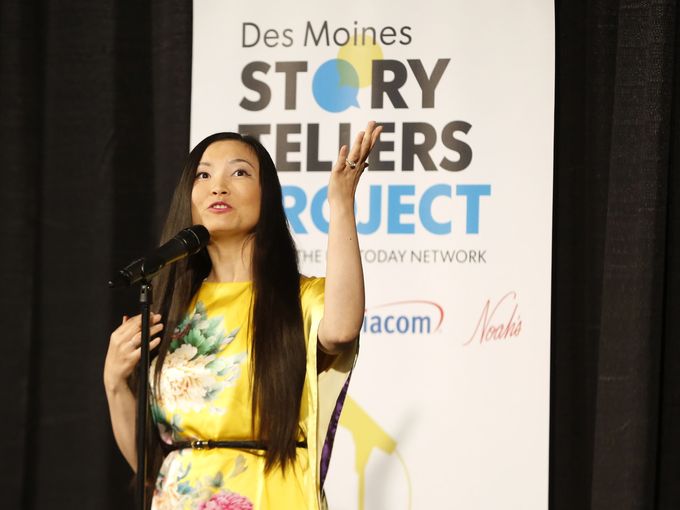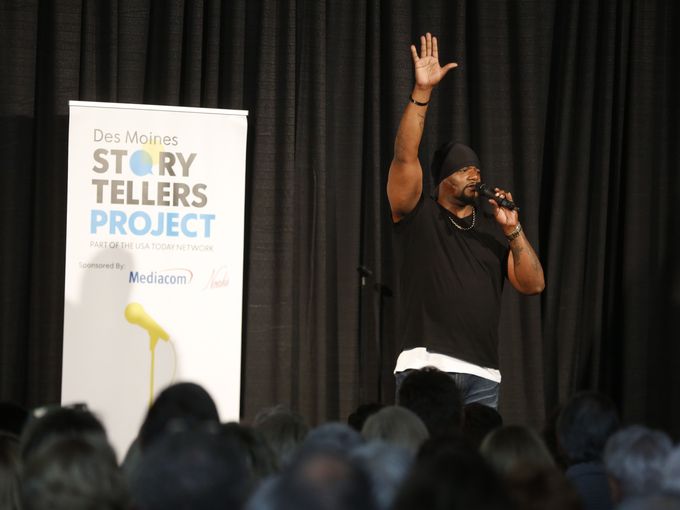Brian Smith remembers the night he realized live storytelling just might work in Des Moines.
The first show in the first full season of The Des Moines Register’s Storytellers Project focused on love and heartbreak. The audience filled the 400 or so seats at the Des Moines Community Playhouse.
On stage, a young man told the audience how he’d learned to love himself after being diagnosed as HIV positive.
Smith, an engagement editor, stood in the back of the theater watching. The speaker’s raw emotions gave the story power. But Smith felt a little nervous about how the audience might react.
He didn’t need to worry.
At several points in the story, the young man paused for waves of applause. And at the end, the audience stood for him.
“That is definitely the moment for me where I knew we had a great program on our hands,” Smith said, “and we had the power to make those connections.”
The Storytellers Project is a now in more than 20 USA Today Network newsrooms. In Des Moines, all seven shows last year sold out. Des Moines Storytellers Project has seven coaches, two people, including Smith, in the newsroom, a dedicated partner in marketing and an editor who pitches in and oversees the work.
This year, the Register tried double-headers, and nearly all of the early shows so far sold out, as have half the late shows. The project earns money from ticket sales and sponsorship, Smith said, and it’s now profitable.
It’s also reaching new audiences, both live on online.
Typically, between 20 and 30 percent of people in the audience are at their first Storytellers’ show in Des Moines, Smith said. Between 60 and 70 percent of people who respond to a post-show survey say they’re Register subscribers, but Smith thinks subscribers are more likely to respond to surveys and that number could be skewed.
“About 25 percent of orders utilize our subscriber discount code,” he said. “So, reality is probably closer to 30 to 40 percent.”
That’s 60 to 70 percent of potential new audiences. And it’s not on accident. Here are a few ways the Register is reaching new people.

First, figure out just who you want to reach
The USA Today Network, which the Register is part of, doesn’t think about audiences in terms of traditional demographics such as age, race or income. Instead, they divvy people up into how they’re driven by behaviors and motivations.
For the Register's Storytellers series, the audiences Smith wants to grow are “family forward”– people concerned with how things affect them and their families; and “know the score” – people who are passionate about specific topics, including sports.
In paid promotions on Facebook, the Register drills in by targeting those groups. They’re also learning from experience this year with two shows a night.
Traditionally, the demographics of Storytellers’ audiences in Des Moines looks a lot like the Register’s subscriber base — older. But the 5:30 and 8:30 evening shows offer a chance to A/B test, Smith said, and so far, they’re bringing in younger audiences for the later shows.
Next year, Smith says they’ll return to single shows in a larger space, and might start a bit later to accommodate that new audience.

Next, use the tools you already have
With any event, Smith said, what’s already in your owned toolbox?
For the Register, it’s online and print house ads and an audience of more than 135,000 on Facebook.
Facebook has been the most powerful, Smith said. The Register uses it to invite people and to post reminders about upcoming shows.
Hi team gets the people going on stage to make sure they’re letting friends and family know about the event. And the Register works to capture emails from attendees, use email campaigns to follow up with a survey after the show and send reminders about upcoming shows.

Now, build in new ways to reconnect
Megan Finnerty, who founded the Storytellers Project and is now the director of the project and runs Gannett’s Storytellers Brand Studio, worked with the Gannett's circulation and sales team on a “nurture campaign.”
What that means, in simple terms, is those teams will go through the emails they collect when people sign up to buy tickets to the Storytellers events, see who isn’t a subscriber and build an email campaign to highlight all the different ways the Register is telling stories. That campaign will include an invitation to get a trial digital subscription.
“The idea is: You come to our nights because our stories affirm your values, and we can highlight other content that the newsroom creates that does the same thing,” Finnerty said in an email. “With repeated exposures, we want to build affinity and awareness through a free subscription as a thank you for three months.”
And finally, don’t think like a journalist
Live storytelling brings journalism to life, Smith said.
But he’s had to learn how to turn off the journalism part of his brain, the part that makes content and shares it. Building audiences requires even more work.
“We really have to think like business owners and marketers,” Smith said. “We have to build these relationships with people.”
Next week, we’ll take a look at what you shared about reaching new audiences. If you have more ideas, send them now! In the meantime, there are so many bad news links to share this week, from newspaper tariffs to deep cuts at the New York Daily News to ongoing layoffs.
There are also, quietly, some really cool things happening in local newsrooms. Framed By WDET, which brings together photojournalism and audio storytelling through an event, has launched a Kickstarter to create a book and multimedia exhibit. A town in Vermont helped the newspaper get the paper out after a fire. The Marshalltown, Iowa, Times-Republican lost power last week in a tornado that tore through downtown, but staff kept covering the story, as they did in Pella at The Chronicle and Knoxville at the Journal Express. (Thanks to subscriber Jeff Forward for sharing their work!) Maynard Institute has announced its next fellowship class. And you have until next month to apply for the Poynter-NABJ Leadership Academy for Diversity in Digital Media.
See you next week!
Correction: An earlier version of this story shared a link to sign up for Maynard Institute's fellowship program. It should have been a link sharing the next class of fellows. It has been corrected. We apologize for the error.







